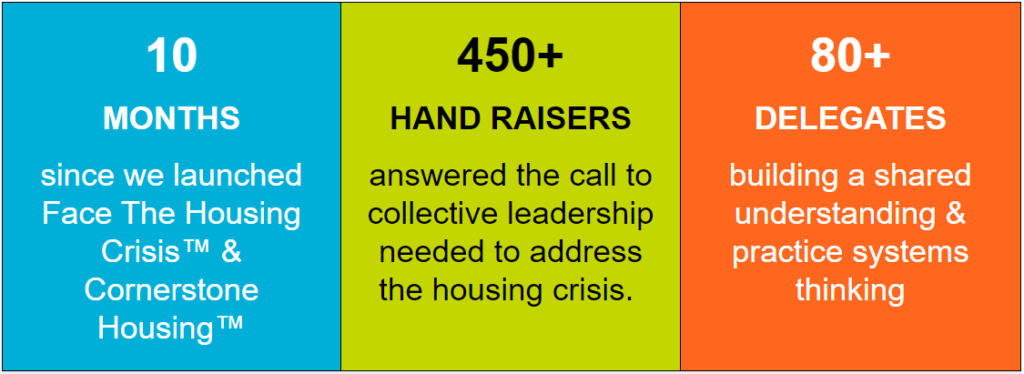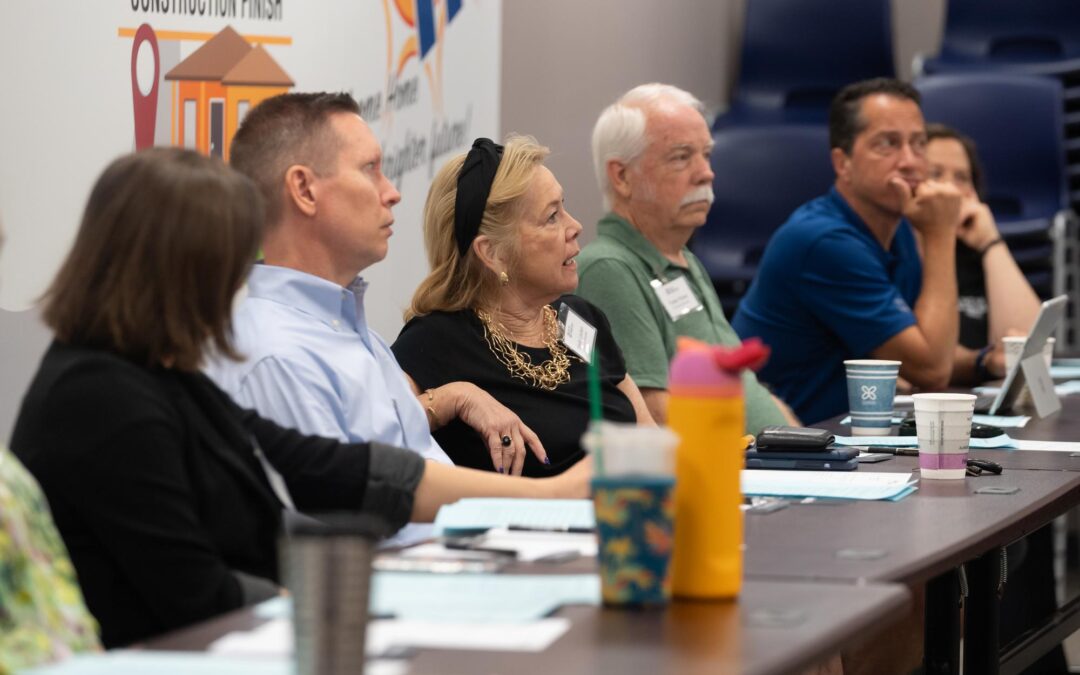In August 2023, Habitat for Humanity Greater Orlando & Osceola County released Face The Housing Crisis™: A Community Charter for Collective Leadership. The charter simultaneously acknowledged that Central Florida, like so many other regions across America, is wading through a housing crisis and presented a framework, steeped in a collective impact model and systems thinking[1], to guide solutions development.
Note the use of the term “solutions,” plural. The housing market is a complex system that serves competing purposes to different players, i.e., to provide shelter versus to make money. The housing market also often ignores political boundaries, governed instead by how far someone is willing to commute between home and work. This makes the housing crisis a wicked problem without a single solution.
Since last August, we’ve asked residents of Central Florida to raise their hands to help tackle the housing crisis and join our collective impact work.
From a group of more than 450 initial hand raisers, an assembly of over 80 committed regional leaders (delegates) have been meeting regularly to build a shared understanding of just how complex an issue the housing crisis is and build skills in systems thinking.

For example, consider from a system’s perspective, the possible reactions of the housing market from a large influx of new residents to a region, presented in step-by-step order.
1. More people move to a region and the demand for housing increases.
2. This increased demand raises home and rent prices.
3. Developers begin building new homes due to increased demand and home prices, but there is a delay in their response. This time lag means home prices continue to increase in the short term.
Steps 1-3 are widely understood. Increased demand increases prices, which spurs new development. But delegates are going levels deeper in their analysis, investigating the possible feedback loops created by the time lag in home building.
4. Rising prices create a sense of prosperity and growth in the region, attracting more businesses and people. This raises prices even more.
5. Speculative investment also increases. Investors see rising prices and buy multiple properties as assets expecting prices to rise in the future.
6. Rising home prices lead to an affordability crisis as low-to-middle-income residents find themselves priced out of the market and the cost-of-living increases in the region.
Delegates are exploring these dynamics and familiarizing themselves with systems thinking language in workshops facilitated by Habitat Orlando & Osceola. Raising the capacity of regional leaders in government, banking, real estate development, non-profits, etc. to assess system-wide implications of proposed solutions to the housing crisis will be a key element in a successful collective impact approach.
The next phase of the work is to do just that, by assessing the system-wide implications of proposed housing crisis solutions. In a series of workshops on May 15, delegates prioritized a list of possible solutions and made it clear which they would like to research and understand first. Zoning reform, with a specific focus on accessory dwelling units (ADUs) and alternative building transformations (i.e., turning malls and hotels into affordable housing) rose to the top as delegates ranked their interests. These two topics will be the first that the group explores for their potential and feasibility to impact the housing crisis in Central Florida.
Note that these are not the only solutions this work will cover. As mentioned previously, the wicked nature of the housing crisis means that multiple interventions happening simultaneously across sub-systems will need to be attempted as we work together to Face the Housing Crisis™.
Get engaged
To stay updated on this work, we encourage you to raise your hand and be part of building a shared understanding about the wicked nature of the housing crisis.
If you have already raised your hand and wish to become a delegate of this work, please email pfleming@habitatorlando.org.
[1] Collective impact models tackle complex societal challenges and require multiple stakeholders to be aligned and moving toward the same goal. Successful collective impact initiatives require: a common agenda, shared measurement, mutually reinforcing activities, continuous communication, and a backbone support organization. See this article from the Stanford Social Innovation Review for more information. Relatedly, “systems thinking is a set of principles, methods, and tools to understand complexity in a way to achieve a desired purpose.”, Peter Stroh, 2018. Systems thinking acknowledges complexity and that all parts of a whole are interconnected. With systems thinking tools in our toolbelt, we will be better equipped to implement a collective impact model.

